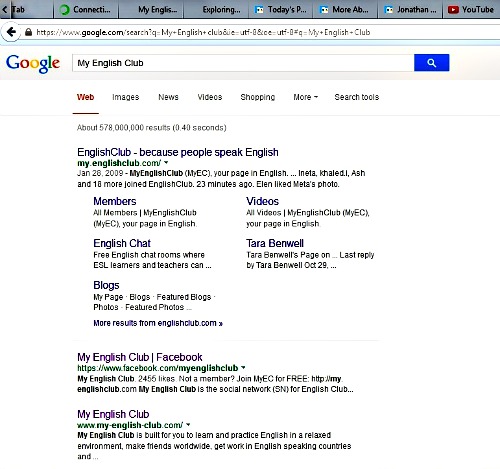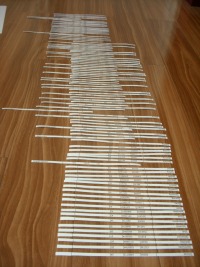| Back to Back Issues Page |
 |
|
Issue #033 -- Week 21/12/14-27/12/14 December 31, 2014 |
Hello,Happy Exit for 2014 ~ Happy New Year 2015!Let me share our good news with you: last night, just out of curiosity, I googled My English Club and I was so surprised to discover it came on THIRD place, out of “about 578,000,000 results”! Wow, that’s 578 MILLION websites! Having started to work on it exactly 2 years ago and in spite of the fact that during the past 16 months I could spend very little time on it, due to my highly demanding jobs, my dying father and my move from China to the Kingdom of Saudi Arabia, which was not easy, I assure you. Check it out for yourselves:

A warm welcome to our new subscribers! I wish you will find My English Club fun and instructive and I look forward to welcome you as a new valued member soon. Read, learn and communicate around the world! Please feel free to contribute to these pages when you have a minute. They are meant to be a platform for exchanging ideas, stories and opinions - an ideal medium for practicing your English, which should be used to the full. Together, let's bring it alive, let's make it the welcoming community you wished for, when you joined. You and your friends can subscribe individually through the form on My English Club. If anybody mentions to you that they are interested in receiving it, please tell them this - many thanks. Also, they can read the previous issues on Back Issues for English Corner E-zine. Month 4 ~ Lesson 17We started studying three subjects back in September 2014: pronunciation and grammar for improving your communication skills, as well as website design and development, for applying your English in practice once you get skilful in English and website building. Once we covered the basics of pronunciation, we started a new course in reading. You can find our past lessons as follows: Pronunciation: Reading ~ Traditional Vocabulary GamesWe’ve considered vocabulary games for beginners and children in our last issue, but let us look at some vocabulary building exercises for more advanced students. i) This exercise is for the beginner/elementary level, but you may find that even advanced students need time to think about the meaning of these words before answering. Here we have to deal with some words that sound the same in English, but have different meanings. Can you tell the difference? Choose the correct one, to answer the questions below: 1. Which is short for ‘it is’? [it’s / its] ii) Moving on, the following exercise on Classification nouns is for the elementary/lower intermediate level. Here you have to write one name for the group of words, following the example: 1. elephant, bear, tiger, lion = A N I M A L S iii) Now for the intermediate students, let’s have a funny exercise. You need to change the word BEAR into COAT in eleven stages, by changing only one letter at a time: B E A R
iv) Another fun exercise for the upper intermediate level is based on word association. The following groups of four words are all connected with the same thing. Write down the missing word in each group. Take a look at this example first: bark, trunk, leaf, branch [TREE] 1. cell, warder, sentence, bars = _ R _ _ O _ v) And last, but not least, let’s have some advanced level fun with some idiomatic phrases. Choose the suitable word for each sentence from the following selection: bone, casting, chain, confirmed, dead, dirt, Dutch, flat, foregone, French, hush, inside, marked, open, pitch, splitting, soft, sore, stone 1. He’s a _____ smoker. No sooner has he stubbed out one cigarette than he lights another. OK, my friends, and … just to keep the suspense level up high for the festive season, I’ll give you the answers in our next issue. Take your time and have fun with them in the meanwhile!
Grammar ~ Grammar with Fun!Hoping you’re all having a great winter holiday, let’s also jazz the grammar part up a bit with some fun grammar games – would you like that? To start with, I’ll recommend a nice and easy game for the beginners. You need to choose the correct plural form of the given words, in order to help the twin sisters Pearl and Flora to find their friends in the bubble machine. Go to this site, if this game is for you. Then, for the intermediate students (beginners can try their hands at this game as well, mind), I found a really great one for practising the irregular verbs on this site: The Irregular Verbs Wheel . There are some things in English that can only really be learnt through practice. Irregular verbs are tricky and inconsistent - that’s why they’re called ’irregular’. You can practise conjugating irregular verbs by spinning the irregular verb wheel. Some are easy and some difficult, but how fast can you conjugate correctly? And finally, for our advanced subscribers - not one, but TWO Phrasal Verbs Games! Phrasal verbs may seem obvious to native English language speakers, but for learners they can be mystifying. Knowing your phrasal verbs brings you much closer to speaking fluently. In Game 1 , you need to choose the correct synonym or antonym of the given word. Look at the top word, then look at the word underneath it. Then you have 2 choices: a) If the word underneath it is a synonym, then you have to decide which of the three phrasal verbs that follow is closest in meaning to the top word and click on that. You get 5 points for a correct answer, and a bonus 10 points if you click the correct answer within 5 seconds. After that, we have Game 2 , in which version, you'll see a dictionary example containing a phrasal verb in the top box - but the particle (adverb or preposition at the end) is missing. You need to choose the correct particle from the four red boxes and click on it. To help you, the definition of the phrasal verb appears in black print above your four choices. You get 5 points for a correct answer and a bonus 10 points if you click the correct answer within 5 seconds. Well, I shall retrieve, with no further ado, to let you play in piece – I have my own games to play, you see. Website Design ~ Finish your Site Content BlueprintYour blueprint should be so clear and solid that the site can almost write itself! And your schedule should realistically enable you to execute the plan. When I started this website, in November 2012 - only two years ago, I made a conscious decision to follow this advice. I selected the best 100 keywords out of my MKL and I cut them out in strips of paper, so I can visualise their connectivity and build my blueprint somewhere I could see it clearly, in order to conceptualise the relationships between those words and physically build a kind of a skeleton onto which I would add the flesh little by little, as my free time would realistically allow. This is how My English Club started, on my living room floor in Donghai:
But until then, where do you start your own website’s blueprint? Your home page, of course! Because your Site Concept Keyword is one of your highest Demand keywords, you need to start from your home page, on TIER 1. Ultimately, it will be the most highly visited page. It won't be your first page to rank highly at the engines (it will likely be one of the last since it also has one of the highest Supply values among your Specific Keywords). TIER 2 pages are the critical hub pages between your home page (TIER 1) and your TIER 3 pages (usually the last effective tier). They logically flow/link into TIER 3 pages. High Demand and high CPC are nice bonuses. Why? These pages will, once your site matures, be found at the engines more frequently than TIER 3 pages. And since they are "navigation pages," visitors will click to visit them more often, too. So plan to monetize your TIER 2 pages, one way or another. Site structure (i.e., natural flow/linking to numerous TIER 3s) is most important. Humans must feel that you have sliced and diced a site in a logical, easy-to-understand manner. TIER 3 The mass of your content ultimately resides in TIER 3. Think of it as the big, solid foundation of your 3-TIER structure. If you have chosen your TIER 2s well, these keywords are easy to slot into place. How Big/Detailed Should Your Site Content Blueprint Be? Great question! The answer depends on you. How detailed do you like to plan? You only have to include the number of pages in your blueprint that you will have time to build during your first 6 months to 1 year. Three quick examples... No, you do not have to write them all this week! Instead, make a schedule according to the time available for your site. Suppose you can only spend an hour or two per week on your site. A 50-page blueprint is fine because you will build 1 or 2 pages per week. Making a realistic schedule, and sticking to it, is one of the big keys to success, not just in SBI!, but in life. I haven’t started to monetize yet, but I have a plan for this. As we finish this lesson tonight, we’re going to start the chapter on investigating and planning monetizing ideas for our website-to-be. My plan is to follow the lessons contained in that chapter and give you practical examples applied to My English Club – in a sense, we are going to study this for real together. The complete process is the CTPM, if you remember, of which we’ve been concentrating on the CTP so far. For those of you who are not familiar with the CTPM, this stands for Content, Traffic, PREselling and Monetize, of which we talked in Issue 016 , back in September this year. A Very Happy New Year to you, my friends!Take a break during the Festive Season and have some fun with the games I suggested above. Write us a card and share your joy with other MEC members worldwide. Please feel free to comment and suggest your ideas by replying to this email - I look forward to hearing from you. Have fun, more than usually! Lucia da Vinci Founder of My English Club |
| Back to Back Issues Page |
